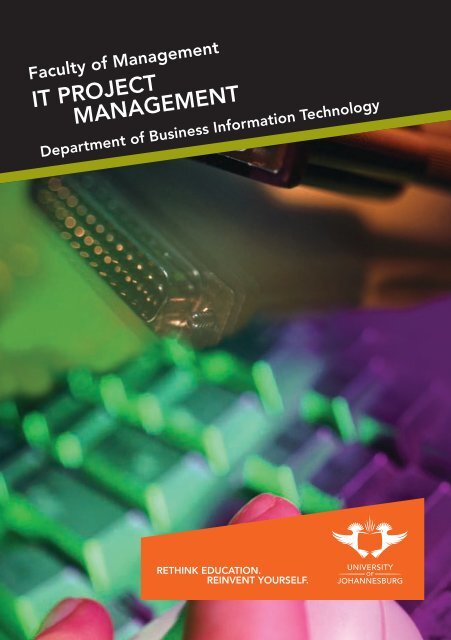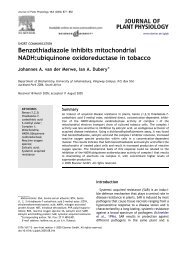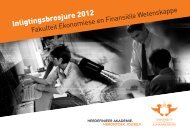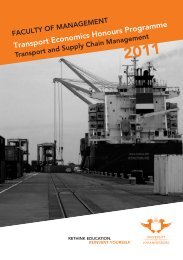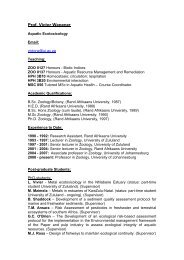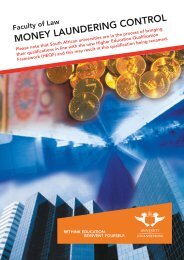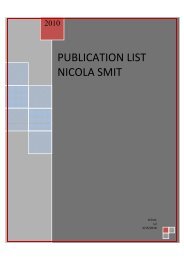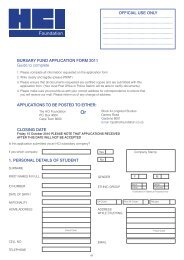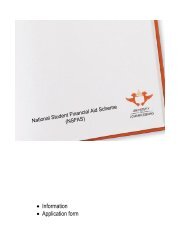ITPM short course brocure.pdf - University of Johannesburg
ITPM short course brocure.pdf - University of Johannesburg
ITPM short course brocure.pdf - University of Johannesburg
- No tags were found...
You also want an ePaper? Increase the reach of your titles
YUMPU automatically turns print PDFs into web optimized ePapers that Google loves.
7PROJECT MANAGEMENT INSTITUTE (PMI) CERTIFICATIONSAs a PMI R.E.P., our <strong>course</strong>s satisfy the prerequisite requirement for the following PMIcredentials:UJ CoursesIT Project Management (Introduction)IT Project Management (Intermediate)orIT Project Management (Advanced)PMI CredentialCertified Associate in ProjectManagement (CAPM)Certified Project ManagementPr<strong>of</strong>essional (PMP)
9Course ContentUnit 1 - Initiating projects - providesan introduction to the five projectmanagement process groups. It alsodescribes in detail the initiating processand the key outputs <strong>of</strong> initiating aproject (stakeholder analysis, businesscase, project charter, kick-<strong>of</strong>f meeting,and preliminary scope statement) andprovides detailed examples <strong>of</strong> eachoutput.Unit 2 - Project planning - providesdetailed information about planninga project and focuses on the projectintegration, scope, time, cost, quality,human resource, communications,risk, and procurement managementknowledge areas.Several <strong>of</strong> the concepts are crucial toproject management and include howto develop a work breakdown structure(WBS), prepare a project scheduleand create a cost baseline. Sampledocuments include a team contract,project management plan, scopemanagement plan, scope statement,WBS, WBS dictionary, project schedule(including a network diagram and Ganttchart), cost estimate and cost baseline.Unit 3 - Executing projects - providesdetailed information about what isinvolved in executing a project accordingto the project plan.quality. It focuses on the importance <strong>of</strong>monitoring and controlling projects wellto ensure that stakeholder needs are met.Unit 5 - Closing projects - providesdetailed information about what isinvolved in closing a project andfocuses on the project integration andprocurement management knowledgeareas. It also summarizes information fromseveral sources on best practices. Manyorganizations are interested in knowingand applying best practices, especiallyto improve their project managementpractices.Specific outcomes•• Demonstrate knowledge <strong>of</strong> theproject and the project managementprocedures.•• Develop project procedures,standards and templates .•• Work with others to undertake orsupport the project managementactivities.•• Assist the project manager and/orproject team by contributing andparticipating in planning, executionand control activities.•• Support the project environmentand management activities to deliverproject objectivesUnit 4 - Monitoring and controllingprojects - provides detailed informationabout monitoring and controllingprojects. It includes many different topics,tools and techniques, especially asthey relate to earned value analysis and
PrerequisitesThe minimum academic entrancerequirement is a Matric Certificate or anequivalent NQF level 4 qualification.In addition to this, a minimum <strong>of</strong> 12months <strong>of</strong> practical experience in theworking environment.The <strong>course</strong> assumes a basicunderstanding <strong>of</strong> IT terminology andrequires some basic math skills.Class attendance is compulsory. Only<strong>course</strong> attendees with an attendancerecord <strong>of</strong> more than 80% will be allowedto write the exams.DatesThe 3-day <strong>course</strong> is presented three timesa year and each <strong>course</strong> is followed by anexam. Your space is confirmed on receipt<strong>of</strong> the deposit or the full amount.•• 01 – 03 April 2009(Exam: 25 April 2009)•• 24 – 26 June 2009(Exam: 25 July 2009)•• 02 – 04 September 2009(Exam: 26 September 2009)The <strong>course</strong> starts at 09:00 in themorning and continues until 17:00.FeesThe cost <strong>of</strong> the full time <strong>course</strong> is R4 750for 2009 and includes all training sessions,lecture notes, textbooks, documentation,case studies, examination fees, lunch andrefreshments. It also includes 1 year freeAssociate Membership to PMSA worthR530.10
11IT PROJECT MANAGEMENT (INTERMEDIATE)IntroductionThe main objective <strong>of</strong> this <strong>course</strong> is toexpose you to the core principles <strong>of</strong> ITproject management. By looking at allthe core knowledge areas involved in ITproject management, a basic view can beformed. This will be helpful in fulfillingyour role in leading or managing a projector as a team member working on an ITproject.All too <strong>of</strong>ten people find themselves inproject management roles without havingformal project management trainingor experience. This is the number onereason why projects fail.Who would benefit?This <strong>course</strong> is aimed at anyone involved inIT projects including:•• IT programme managers•• IT project leaders•• IT project managers•• IT project controllers•• IT project team members•• IT consultants•• Any person that is responsible for, orpart <strong>of</strong> a project team, working on ITprojects.The <strong>course</strong> consists <strong>of</strong> a theoretical anda practical component. The textbookas well as additional reading covers thetheoretical component. The practicalcomponent is made up <strong>of</strong> a number <strong>of</strong>case studies as well as some exercisesduring the chapters.
Course ContentThe <strong>course</strong> is divided into the following modules:Module Unit DescriptionModule 1Introduction to IT projectmanagement frameworkModule 2IT project managementprocess groupsModule 3IT project managementknowledge areas1 Introduction to IT project management2The Project Management and InformationTechnology Context3 The Project Management Process Groups4 Project Integration Management5 Project Scope Management6 Project Time Management7 Project Cost Management8 Project Quality Management9 Project Human Resource Management10 Project Communications Management11 Project Risk Management12 Project Procurement ManagementUnit 1 - Introduction to ProjectManagement - provides an introductionto the field <strong>of</strong> project management,emphasising the area <strong>of</strong> informationtechnology projects. It defines what aproject is, what project managemententails, the role <strong>of</strong> the project manager,and important key terms. It also providesa brief history <strong>of</strong> project managementand discusses the project managementpr<strong>of</strong>ession.Unit 2 - The Project Managementand Information Technology Context- discusses the context <strong>of</strong> projectmanagement in general and informationtechnology projects in particular. Itdescribes the importance <strong>of</strong> taking asystems view when selecting and workingon projects, understanding organizationsand stakeholders, matching productlife cycles to the project environment,and understanding the unique nature <strong>of</strong>information technology projects.12
13Unit 3 - The Project ManagementProcess Groups - describes the fiveproject management process groups andhow they relate to the nine knowledgeareas. It also describes how organisationscan develop their own informationtechnology project managementmethodologies to help manage projectsin their unique environments. A largepart <strong>of</strong> this unit describes how to applythe project management processgroups (initiating, planning, executing,controlling, and closing) to an informationtechnology project.Unit 4 - Project IntegrationManagement - provides detailedinformation on the first <strong>of</strong> the nineknowledge areas, project integrationmanagement. Included is also a sectionon strategic planning and projectselection. Like previous units, Unit 4emphasizes the importance <strong>of</strong> makingsure projects fit into the big picture <strong>of</strong>an organization. It also highlights theneed for new project managers to makethe transition from working in the highlytechnical realm to focusing on projectmanagement and meeting businessneeds.Unit 5 - Project Scope Management -discusses a very important knowledgearea and part <strong>of</strong> the triple constraint.After projects are selected and initiated,project managers must clearly andthoroughly define the extent <strong>of</strong> the workand the ways in which it will be done.Important tools include developing thescope statement and creating a workbreakdown structure. Both <strong>of</strong> these toolsare crucial to good project management.Unit 6 - Project Time Management- discusses another very importantknowledge area and part <strong>of</strong> the tripleconstraint. Key concepts in this unitinclude developing project schedules,creating network diagrams and Ganttcharts, critical chain scheduling, andPERT.Unit 7 - Project Cost Management -provides an introduction to the thirdknowledge area <strong>of</strong> the triple constraint.Important topics include basic projectcost management principles, concepts,and terms, resource planning, types <strong>of</strong>cost estimates, cost budgeting, earnedvalue management, and project portfoliomanagement.Unit 8 - Project Quality Management- highlights the importance <strong>of</strong> qualityin information technology projects,defines quality and quality management,and explains the processes <strong>of</strong> qualityplanning, quality assurance, and qualitycontrol. The unit provides severalexamples <strong>of</strong> various tools and techniques,such as Pareto diagrams, quality controlcharts, and Six Sigma, to improve quality.Unit 9 - Project Human ResourceManagement - introduces the firstfacilitating knowledge area. This unitcovers many important topics, and whole<strong>course</strong>s are devoted to improving humanresource management. The unit reviewsbasic topics, such as motivation, andemphasize what project managers andteams need to know to make effectiveuse <strong>of</strong> human resources.
Unit 10 - Project CommunicationsManagement - describes anotherimportant facilitating knowledge area.The unit explains the processes involvedin project communications management,methods for improving projectcommunications, and the ways in whichvarious types <strong>of</strong> s<strong>of</strong>tware can enhancecommunications.••••In addition to this, either a minimum<strong>of</strong> 12 months <strong>of</strong> practical experiencein the field <strong>of</strong> IT projects, or thesuccessful completion <strong>of</strong> any otherproject management <strong>course</strong>, isrequired.The <strong>course</strong> assumes a basicunderstanding <strong>of</strong> IT terminology andrequires some basic math skills.Unit 11 - Project Risk Management- provides an introduction to projectrisk management, one <strong>of</strong> the mostmisunderstood knowledge areas <strong>of</strong>project management. Topics includewhat risk is and why risk managementis important, project risk managementprocesses, tools, and techniques, theTop Ten Risk Item Tracking technique,sensitivity analysis, and simulation.Unit 12 - Project ProcurementManagement - provides anintroduction to the last <strong>of</strong> the nineproject management knowledge areas.Depending on the project environment,project managers may need to know a lotor very little about this area. Importanttopics include the growth in procurementfor information technology projects,the processes involved in procurementmanagement, and the types <strong>of</strong> s<strong>of</strong>twareavailable to assist in procurementmanagement.Prerequisites•• The minimum academic entrancerequirement is a Matric Certificateor an equivalent NQF level 4qualification.•• Class attendance is compulsory. Only<strong>course</strong> attendees with an attendancerecord <strong>of</strong> more than 80% will beallowed to write the exams.DatesThe 5-day <strong>course</strong> is presented four timesa year and each <strong>course</strong> is followed by anexam. Your space is confirmed on receipt<strong>of</strong> the deposit or the full amount.•• 30 March – 03 April 2009(Exam: 25 April 2009)•• 22 June – 26 June 2009(Exam: 25 July 2009)•• 31 August – 04 September 2009(Exam: 26 September 2009)•• 23 November – 27 November 2009(Exam: 23 January 2010)The <strong>course</strong> starts at 09:00 in themorning and continues until 17:00.FeesThe cost <strong>of</strong> the full time <strong>course</strong> is R7 750for 2009 and includes all training sessions,lecture notes, textbooks, documentation,case studies, s<strong>of</strong>tware, examination fees,lunch and refreshments. It also includes1 year free Associate Membership toPMSA worth R530.14
15IT PROJECT MANAGEMENT (ADVANCED)IntroductionThe main objective <strong>of</strong> this <strong>course</strong> is toprovide attendees with a holistic, detailedview <strong>of</strong> IT Project Management. All too<strong>of</strong>ten IT projects fail due to the limitedunderstanding <strong>of</strong> all the components andissues involved.IT Project Management has beenrecognised by the Department <strong>of</strong> Labour(DoL) as a scarce skill. The need forqualified and knowledgeable IT projectmanagers has risen in recent years. At thesame time, the complexity <strong>of</strong> IT projectshas also increased. Project managementhas grown from a best practice to ascience that is supported by scientificresearch, industry standards, pr<strong>of</strong>essionalcertifications and communities <strong>of</strong>practice.You will no doubt be responsible formanaging or leading a project. It istherefore <strong>of</strong> utmost importance to equipyourself with the necessary knowledge,tools, techniques and skills to fulfil thisrole.Who would benefit?This <strong>course</strong> is aimed at anyone involved inIT projects including:•• IT programme managers•• IT project leaders•• IT project managers•• IT project controllers•• IT project team members•• IT consultants•• Any person that is responsible for, orpart <strong>of</strong> a project team, working on ITprojects.The <strong>course</strong> is based on the PMBoK andcan therefore be used as preparation forthe PMP exam. The <strong>course</strong> will improveyour knowledge and hone your existingskills and complements any other projectmanagement <strong>course</strong>s that you might havedone before.
Course ContentThe <strong>course</strong> is divided into the following modules:Module Unit DescriptionModule 1Introduction to IT projectmanagement frameworkModule 2IT project managementprocess groupsModule 3IT project managementknowledge areas1 Introduction to IT project management2The Project Management and InformationTechnology Context3 The Project Management Process Groups4 Project Integration Management5 Project Scope Management6 Project Time Management7 Project Cost Management8 Project Quality Management9 Project Human Resource Management10 Project Communications Management11 Project Risk Management12 Project Procurement ManagementUnit 1 - Project Management Processgroups - describes the five projectmanagement process groups and howthey relate to the nine knowledge areas.It also describes how organisations candevelop their own information technologyproject management methodologies tohelp manage projects in their uniqueenvironments. A large part <strong>of</strong> this unitdescribes a detailed case study to showhow to apply the project managementprocess groups (initiating, planning,executing, controlling, and closing) to aninformation technology project.Unit 2 - IT Project IntegrationManagement - provides detailedinformationon the first <strong>of</strong> the nineknowledge areas. Included is also asection on strategic planning and projectselection. Like previous units, unit 2emphasizes the importance <strong>of</strong> makingsure projects fit into the big picture <strong>of</strong>an organization. It also highlights theneed for new project managers to makethe transition from working in the highlytechnical realm to focusing on projectmanagement and meeting businessneeds.16
17Unit 3 - IT Project Scope Management- discusses a very important knowledgearea that is part <strong>of</strong> the triple constraint.After projects are selected and initiated,project managers must clearly andthoroughly define the extent <strong>of</strong> the workand the ways in which it will be done.Important tools include developing thescope statement and creating a workbreakdown structure. Both <strong>of</strong> these toolsare crucial to good project management.Unit 4 - IT Project Time Management- discusses another very importantknowledge area that is part <strong>of</strong> the tripleconstraint . Key concepts in this unitinclude developing project schedules,creating network diagrams and Ganttcharts, critical chain scheduling and PERT.Unit 5 - IT Project Cost Management- provides an introduction to the thirdknowledge area <strong>of</strong> the triple constraint.Important topics include project costmanagement principles, concepts, andterms, resource planning, types <strong>of</strong> costestimates, cost budgeting, earned valuemanagement and project portfoliomanagement.Unit 6 - IT Project Quality Management- highlights the importance <strong>of</strong> qualityin information technology projects,defines quality and quality management,and explains the processes <strong>of</strong> qualityplanning, quality assurance, and qualitycontrol. The unit provides severalexamples <strong>of</strong> various tools and techniques,such as Pareto diagrams, quality controlcharts, and Six Sigma, to improve quality.Unit 7 - IT Project Human ResourceManagement - introduces the firstfacilitating knowledge area. This unitcovers many important topics, and whole<strong>course</strong>s are devoted to improving humanresource management. Review basictopics, such as motivation, and emphasizewhat project managers and teams needto know to make effective use <strong>of</strong> humanresources.Unit 8 - IT Project CommunicationManagement - describes anotherimportant facilitating knowledge area.The unit explains the processes involvedin project communications management,methods for improving projectcommunications, and the ways in whichvarious types <strong>of</strong> s<strong>of</strong>tware can enhancecommunications.Unit 9 - IT Project Risk Management- provides an introduction to projectrisk management, one <strong>of</strong> the mostmisunderstood knowledge areas <strong>of</strong>project management. Topics includewhat risk is and why risk managementis important, project risk managementprocesses, tools, and techniques, theTop Ten Risk Item Tracking technique,sensitivity analysis, and simulation.Unit 10 - IT Project ProcurementManagement - provides anintroduction to the last <strong>of</strong> the nineproject management knowledge areas.Depending on the project environment,project managers may need to know a lotor very little about this area. Importanttopics include the growth in procurement
for information technology projects,the processes involved in procurementmanagement, and the types <strong>of</strong> s<strong>of</strong>twareavailable to assist in procurementmanagement.PrerequisitesClasses are on the following Saturdaysfrom 09:00 – 17:00:•• Unit 1 14 March 2009•• Unit 2 18 April 2009•• Unit 3 23 May 2009•• Unit 4 20 June 2009••••••••The minimum academic entrancerequirement is a Matric Certificateor an equivalent NQF level 4qualification.In addition to this, either a minimum<strong>of</strong> 12 months <strong>of</strong> practical experiencein the field <strong>of</strong> IT projects, or thesuccessful completion <strong>of</strong> any otherproject management <strong>course</strong>, isrequired.The <strong>course</strong> assumes a basicunderstanding <strong>of</strong> IT terminology andrequires some basic math skills.Class attendance is compulsory. Only<strong>course</strong> attendees with an attendancerecord <strong>of</strong> more than 80% will beallowed to write the exams.•• Unit 5 25 July 2009•• Unit 6 22 August 2009•• Unit 7 19 September 2009•• Unit 8 17 October 2009•• Unit 9 14 November 2009•• Unit 10 28 November 2009FeesThe cost <strong>of</strong> the full time <strong>course</strong> is R13 900for 2009 and includes all training sessions,lecture notes, textbooks, documentation,case studies, s<strong>of</strong>tware, examination fees,lunch and refreshments. It also includes 1year free Associate Membership to PMSAworth R530.DatesThe 10-day <strong>course</strong> is presented over a10 month period that is followed by anexam. Your space is confirmed on receipt<strong>of</strong> the deposit or the full amount.18
19IT PROGRAMME MANAGEMENTIntroductionThe primary purpose is to describe thebest practices and provide guidance formanaging multiple projects and nonprojectactivities within a programmeenvironment. The processes documentedare generally accepted as the necessarysteps to successfully manage aprogramme.The <strong>course</strong> is based on PMI’s Standardfor Program Management (secondedition). The <strong>course</strong> will improve yourknowledge, hone your existing skillsand complements any other project /programme management <strong>course</strong>s thatyou might have done before.Who would benefit?The intention <strong>of</strong> this <strong>course</strong> is to providea sufficiently detailed understanding <strong>of</strong>programme management among thefollowing groups to promote efficientand effective communication andcoordination:Project managers - to understandthe role <strong>of</strong> programme managers andthe interface between project andprogramme managers;Programme managers - to understandtheir appropriate role;Portfolio managers - to understandthe role <strong>of</strong> programme managers andthe interface between programme andportfolio managers;Stakeholders - to understand the role<strong>of</strong> programme managers and how theyengage the various stakeholder groups(e.g., users, executive management,client);Senior managers - to understand therole <strong>of</strong> executive sponsor as part <strong>of</strong> theprogramme board/steering committee.Course ContentThe <strong>course</strong> is divided into thefollowing units:Unit 1 - Programme ManagementLife Cycle - The programme life cyclesserve to manage outcomes and benefits,as contrasted with project life cycles,which serve to produce deliverables.Project products deliver capabilities tothe organisation, while the programmemanages and accrues the correspondingbenefits during the phase called“Delivering the Incremental Benefits.”To ensure that the programme deliversand tracks the expected benefits, there isusually senior management oversight <strong>of</strong>a programme via gate reviews in order tocomply with programme governance.Unit 2 - Initiating Programmes - definesand authorises the programme or aproject within the programme, andproduces the programme benefitsstatement and benefits realisation planfor the programme.
Unit 3 - Planning Process - plans the bestalternative <strong>course</strong>s <strong>of</strong> action to deliver thebenefits and scope that the programmewas undertaken to address.Unit 4 - Executing Process - integratesprojects, people and other resources tocarry out the plan for the programme anddeliver the programme’s benefits.Unit 5 - Monitoring and ControllingProcess - requires that the programmeand its component projects be monitoredagainst the benefit delivery expectationsand that their progress be regularlymeasured, to identify variances from theprogramme management plan. Thisprocess group also coordinates correctiveactions to be taken when necessary toachieve programme benefits.Unit 6 - Closing Process - formalisesacceptance <strong>of</strong> a product, service orbenefit/result and brings the programmeor programme component (e.g. project)to an orderly end.Prerequisites•• Any IT/IS qualification at NQF level6 for example, National Diploma:Information Technology, BSc IT, BScComputer Science, BSc Informatics,BCom IT Management.•• The <strong>course</strong> assumes a basicunderstanding <strong>of</strong> IT terminology andrequires some basic math skills.•• Class attendance is compulsory. Only<strong>course</strong> attendees with an attendancerecord <strong>of</strong> more than 80% will beallowed to write the exams.DatesThe 3-day <strong>course</strong> is presented twice ayear and each <strong>course</strong> is followed by anexam. Your space is confirmed on receipt<strong>of</strong> the deposit or the full amount.•• 29 June – 1 July 2009(Exam: 25 July 2009)•• 23 November – 25 November 2009(Exam: 23 January 2009)The <strong>course</strong> starts at 09:00 in themorning and continues until 17:00.FeesThe cost <strong>of</strong> the full-time <strong>course</strong> is R7 000for 2009 and includes all training sessions,lecture notes, textbooks, documentation,case studies, s<strong>of</strong>tware, examination fees,lunch and refreshments. It also includes1 year free Associate Membership toPMSA worth R530.••In addition to this, either a minimum<strong>of</strong> 12 months practical experience inthe field <strong>of</strong> projects / programmes, orthe successful completion <strong>of</strong> any otherproject / programme management<strong>course</strong>, is required.20
21MICROSOFT OFFICE PROJECTIntroductionThe <strong>course</strong> is based on Micros<strong>of</strong>t’sProject Office 2007. The <strong>course</strong> willimprove your knowledge and hone yourexisting skills on using the s<strong>of</strong>tware tooland complements any other projectmanagement <strong>course</strong>s that you might havedone before.Who would benefit?The primary purpose is to enable projectmanagers and/or project administratorsto draw project plans and to optimisethese plans to ensure the successfulplanning, monitoring and control <strong>of</strong>projects.•• IT programme managers•• IT project leaders•• IT project managers•• IT project controllers•• IT project team members•• IT consultants•• Any person that is responsible for, orpart <strong>of</strong> a project team, working on ITprojects.Course ContentThe <strong>course</strong> is divided into the followingunits:Unit 1 - Project Basics - focuses on theessential information students mustunderstand when creating a new projectplan in Micros<strong>of</strong>t Office Project.Unit 2 - Establishing Resources - focuseson establishing resources for a projectplan in Micros<strong>of</strong>t Office Project.Unit 3 - Resources and TaskAssignments - focuses on linkingresources and tasks. (Depending on thepoint <strong>of</strong> view, they could be resourceassignments or task assignments.) Theunit looks at assigning work, material, andcost resources; tweaking resources andusing Smart Tags.Unit 4 - Refining the Project Plan -focuses on creating task calendars,changing task types, splitting tasks,setting up and applying resources torecurring tasks, applying constraints, andidentifying the critical path.Unit 5 - Sorting, Grouping and Filtering<strong>of</strong> Project Information - focuses onsorting, grouping and filtering projectinformation. The Sort dialog box isreviewed and the three sort levelsare discussed i.e. the ascending anddescending options for each level as wellas the permanently renumber resourcescheck box.Unit 6 - Fundamentals <strong>of</strong> Project PlanFormatting - focuses on using some<strong>of</strong> the special tools such as views andtables, to change the data format to meetthe needs <strong>of</strong> the project manager andshareholders.Unit 7 - Customising and PrintingProject Information - focuses oncustomising and printing views andreports. It starts by reviewing the features
<strong>of</strong> the Page Setup dialog box. Thefunctionality <strong>of</strong> the various buttonsand tabs, as well as their functions isdiscussed.Unit 8 - Fundamentals <strong>of</strong> Project PlanTracking - focuses on the fundamentals<strong>of</strong> project plan tracking. The Task Usageview is reviewed. This view is used toenter time-phased actual work for bothtasks and resources. The time-phasedgrid is used to enter actual work atthe intersection <strong>of</strong> the desired datecolumn and the actual work column forthe desired resource. The differencesbetween where scheduled work andactual work are shown on the grid.Unit 9 - Managing Multiple Projects -focuses on managing multiple projectsby developing consolidated projectsand creating cross-project links. Theconsolidated project Gantt Chart view isreviewed by pointing out the summarytask, inserted project icon and insertedproject Gantt bars. It further looks at howto filter, sort, and group data, as well assee dependencies between projects inthis view.Unit 10 - Fine-Tuning <strong>of</strong> Tasks andResources - focuses on fine-tuning tasksvia the use <strong>of</strong> constraints, deadline dates,and task priorities. The unit begins byreviewing the General tab <strong>of</strong> the TaskInformation dialog box. It further pointsout each <strong>of</strong> the options on this tab andexplain their function. It also focuseson fine-tuning resources and discussesmaterial resource consumption rates.Prerequisites•• The minimum academic entrancerequirement is a Matric Certificateor an equivalent NQF level 4qualification.•• In addition to this, either a minimum<strong>of</strong> 12 months <strong>of</strong> practical experiencein the field <strong>of</strong> projects / programmes,or the successful completion <strong>of</strong> aproject / programme management<strong>course</strong>, is required.•• The <strong>course</strong> assumes a basicunderstanding <strong>of</strong> IT and projectterminology and requires some basicmath skills.•• Class attendance is compulsory. Only<strong>course</strong> attendees with an attendancerecord <strong>of</strong> more than 80% will beallowed to write the exams.DatesThe 2-day <strong>course</strong> is currently onlyavailable as an in-house training <strong>course</strong>.The <strong>course</strong> starts at 09:00 in the morningand continues until 17:00.FeesThe cost <strong>of</strong> the full time <strong>course</strong> is R3 000for 2009 and includes all training sessions,lecture notes, textbooks, documentation,case studies, s<strong>of</strong>tware, examination fees,lunch and refreshments.22
23COURSE PRESENTERSPr<strong>of</strong> Les Labuschagne(PMSA.PM)Pr<strong>of</strong> Les Labuschagne is an AssociatePr<strong>of</strong>essor and Head <strong>of</strong> the BusinessInformation Technology departmentat the <strong>University</strong> <strong>of</strong> <strong>Johannesburg</strong>. Helectures on both graduate and postgraduatelevel and provides supervisionto a number <strong>of</strong> masters and doctoralresearch students. He is an NRF ratedresearcher and has presented severalpapers at local and internationalconferences.Pr<strong>of</strong> Labuschagne is an active Pr<strong>of</strong>essionalMember <strong>of</strong> Project Management SouthAfrica (PMSA) where he currently serveson the Board <strong>of</strong> Directors. Previouspositions include National President andVP: Projects. He has also served as theProgram Chair for the last three PMSAconferences and is the Managing Editor<strong>of</strong> ProjectNet, the <strong>of</strong>ficial publication <strong>of</strong>the PMSA.several other project management relatedsubjects at other tertiary institutions.He is a member <strong>of</strong> the ProjectManagement Institute (PMI),IT SMF SA, and ISACA. He is alsoa pr<strong>of</strong>essional member <strong>of</strong> ProjectManagement South Africa (PMSA).Pr<strong>of</strong> Labuschagne has been presentingIT Project Management <strong>course</strong>s onpostgraduate level and as extra curricular<strong>course</strong>s for more than 9 years. He is theexternal examiner and moderator for
Mr Carl MarnewickMr Carl Marnewick sees the successfulimplementation <strong>of</strong> projects andcompletion <strong>of</strong> tasks as one <strong>of</strong> his mostimportant career objectives. Beingproject driven and customer orientatedby nature, he has always thrived inenvironments, which require teamwork,and are focussed on achieving specificdeliverables that will result in customersatisfaction.The fact that he have a soundknowledge and practical experiencein the implementation <strong>of</strong> EnterpriseResources Planning (ERP) systems andIT infrastructure, project managementas well as focused on the needs <strong>of</strong>the customer has enabled him toestablish a solid track record <strong>of</strong> addingconcrete value in organisations that areimplementing ERP systems and are in theneed <strong>of</strong> customer management.Apart from the fact that he has beeninvolved in the successful implementation<strong>of</strong> ERP systems and customer call centres,he sees his most significant achievementsto date as:Mr Marnewick is currently a seniorlecturer in the Department <strong>of</strong> BusinessInformation Technology and is in theprocess <strong>of</strong> completing his doctorate inthe field <strong>of</strong> project management.He is a member <strong>of</strong> PMI as well as PMSA.He serves as Vice President: Technicaland Education on the National ExecutiveCommittee <strong>of</strong> the PMSA. He is also theUJ representative on the InternationalOrganization for Standardizations (ISO)Technical Committee ISO/PC 236 that isworking on establishing a global standardfor project management.••••••The implementation <strong>of</strong> a solid ITinfrastructure for Premier FoodsThe implementation <strong>of</strong> a customer callcentre to enhance service and supportto customersThe implementation <strong>of</strong> an ERP systemat Premier Foods, Datacentrix and<strong>Johannesburg</strong> City Parks24
25Dr Ernest MnkandlaDr Ernest Mnkandla is a senior lecturerat the <strong>University</strong> <strong>of</strong> <strong>Johannesburg</strong>, inthe Department <strong>of</strong> Business InformationTechnology. He lectures InformationTechnology Management and IT ProjectManagement. He has lectured in ICT formore than eleven years.His educational background includes afirst degree in Electrical Engineering, amasters degree in Computer Science,and a PhD in S<strong>of</strong>tware Engineering.His research interests are in IT projectmanagement, especially the relationsbetween PMI’s PMBoK and Agile ProjectManagement (APM), the adoption issuesin agile s<strong>of</strong>tware development methods,the broader issues <strong>of</strong> s<strong>of</strong>tware processimprovement (SPI), and Organizationaland project maturity models (e.g. CMMI,OPM3).Dr Mnkandla has presented extensivelyon agile methodologies and projectmanagement locally and internationally.He is a member <strong>of</strong> PMSA, CSSA, SAIEE aswell as IEEE.
The Department <strong>of</strong> BusinessInformation Technology (BIT)Business Information Technology (BIT) isa discipline that combines the activities <strong>of</strong>business and information communicationtechnology to facilitate and exploit theuse <strong>of</strong> IT to foster and support businessactivities within the enterprise andexternally to its clients.This innovation is demonstrated by therecent introduction <strong>of</strong> specialisations inIT Management, S<strong>of</strong>tware Development,Information Systems and TechnologyManagement. These specialisationsare <strong>of</strong>fered at diploma, graduate andpostgraduate level.Information technology is one <strong>of</strong> themost exciting, expanding and evolvingfields. There is a chronic <strong>short</strong>age <strong>of</strong>IT pr<strong>of</strong>essionals, and the demand issteadily increasing as the development<strong>of</strong> business opportunities requires welltrained specialists in the latest innovativetechnology.UJ is recognised in South Africa asan institution that meets the needs <strong>of</strong>industry and business. Our programmesfocus on providing students with soughtafterindustry knowledge and skills. Ourprogrammes are innovative and flexible,allowing students to focus on an area<strong>of</strong> IT that meets their interest whileproviding a core <strong>of</strong> basic IT skills.26
27REGISTRATIONA Registration form can be downloadedfrom our website atwww.uj.ac.za/pmContact usIT Project Management: Department <strong>of</strong>Business Information Technology (BIT)Course Content Queries:Pr<strong>of</strong> Les Labuschagne (LL)Tel : 011 559-1216Email : LesL@uj.ac.zaDr Ernest Mnkandla (EM)Tel: 011 559-1217Email : emnkandla@uj.ac.zaRegistration Queries:Carl Marnewick (CM)Tel: 011 559-1316Email : cmarnewick@uj.ac.zaPayment Queries:Mrs Lucinda ZaaymanTel: 011 559-1431Email: lucindaz@uj.ac.zaFax: +27 (011) 559-1239Postal AddressDepartment <strong>of</strong> Business InformationTechnologyPO Box 524Auckland Park2006Physical AddressG Purple 4 (G Block, Lower Level, #4)1 Bunting roadAuckland Park<strong>Johannesburg</strong>2000
AREA MAPBunting rd Campuscampus MAPBIT28
For more information visit www.uj.ac.za or call (011) 559 2637.


